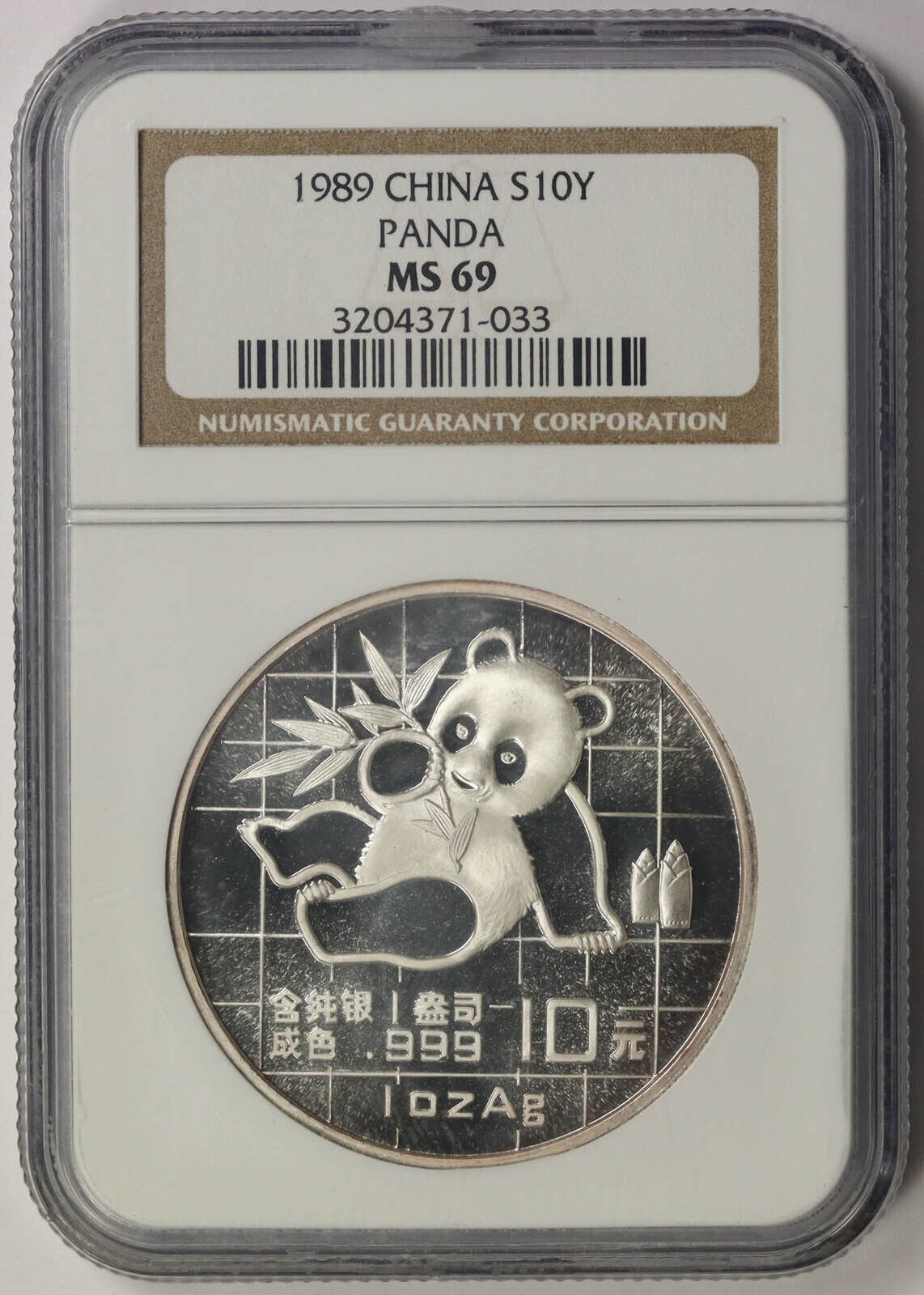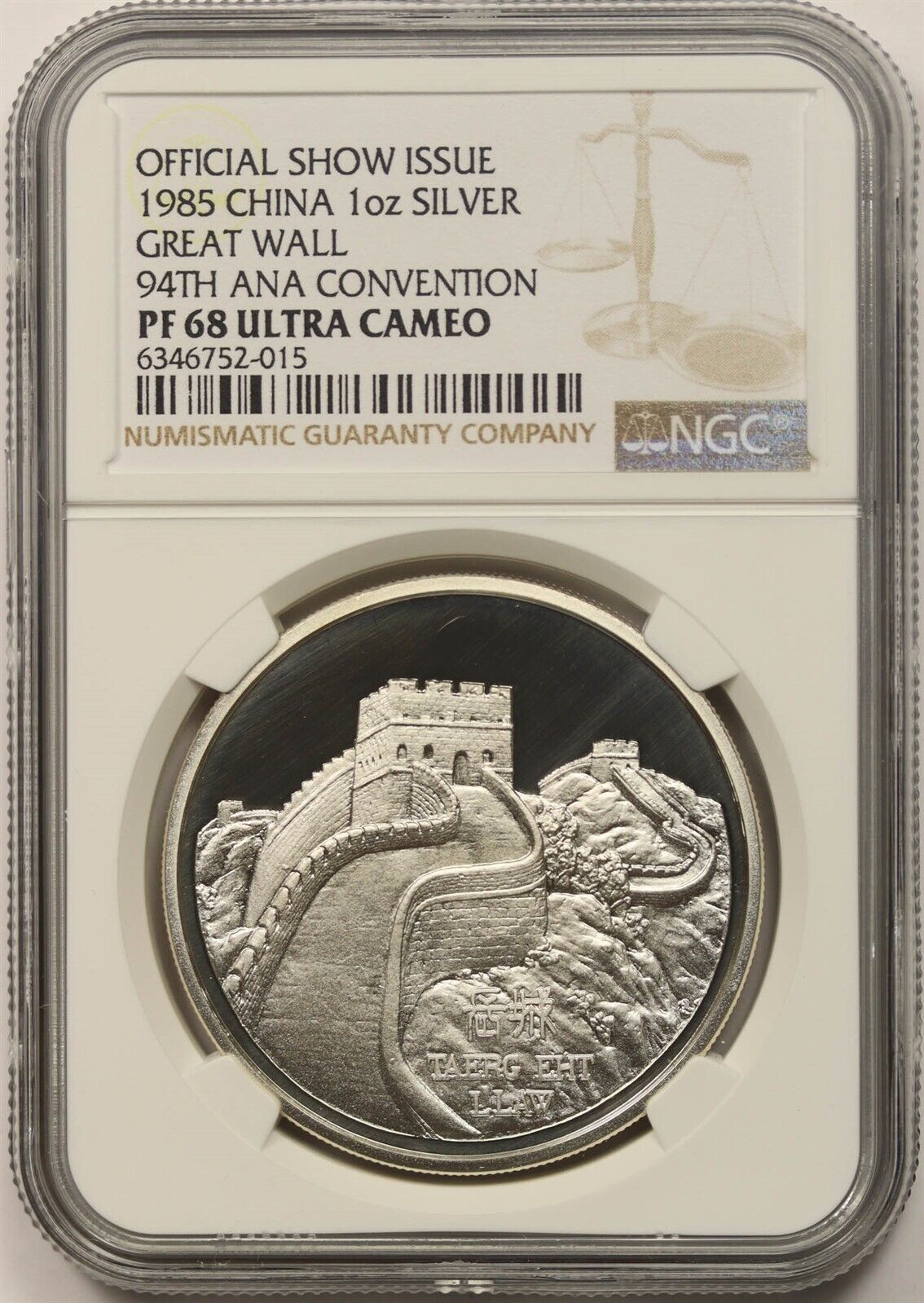-40%
China 2011 Mother Panda Bear & Baby Cub 10 Yuan 1 Oz Pure Silver BU in Capsule
$ 23.68
- Description
- Size Guide
Description
In Stock and Ready for Immediate Shipment!SOLD OUT at the Chinese Mint!
A cute baby panda cub sweetly sniffs its protective mother on this hard to find, pure silver beauty!
N.B.—Original mint-sealed sheets of 30 x 2011 Panda 1 Oz Silver coins are available. Please inquire if seriously interested.
N.B.—Please note
that these are the full one troy ounce (31.1g) weight silver pandas, and not the reduced weight 30g coins.
This beautiful coin is part of the highly collectible series of one ounce, pure silver pandas. The obverse design of this series, with the panda bear, changes each year, further enhancing its collectibility. The reverse features the Temple of Heaven. Many years of the silver panda can be very difficult to locate, much less in pristine condition (and they always increase in value!), so we advise buying a date that you need or want when you find it.
A Living Teddy Bear
The giant panda is a large, black and white mammal currently classified in the bear family (
Ursidae
), indigenous to central-western and southwestern China. The panda was previously thought to be a member of the
Procyonidae
family, which includes raccoons. It is easily recognized by its large, distinctive black patches around the eyes, over the ears, and across its round body. Though it belongs to the order
Carnivora
, the panda has a diet which is 99% bamboo. Pandas may eat other foods such as honey, eggs, fish, yams, shrub leaves, oranges and bananas when available.
Giant pandas live in a few mountain ranges in central China, in Sichuan, Shaanxi, and Gansu provinces. They once lived in lowland areas, but farming, forest clearing, and other development now restrict pandas to the mountains.
The giant panda is an endangered species. According to the latest report, China has 239 giant pandas in captivity, with another 27 pandas residing outside their native country. It also estimated that around 1,590 pandas are currently living in the wild. However, a 2006 study using DNA analysis estimated that there might be as many as 2,000 to 3,000 pandas in the wild. Though reports show that the numbers of wild pandas may be on the rise, the World Conservation Union believes there is not enough certainty to remove pandas from the endangered animal list.
A National Symbol
While the dragon has historically served as China's national emblem, in recent decades the giant panda has also served as an emblem for the country. The species is a favorite of the public, at least in part because many people find that it has a baby-like cuteness, resembling a living teddy bear. It is usually depicted reclining or peacefully eating bamboo, as opposed to hunting, which adds to its image of preciousness and innocence. Though giant pandas are often assumed to be docile, they are in fact wild animals and have been known to attack humans, presumably out of irritation rather than predatory behavior.
Please see the article lower in this presentation for a discussion of the Temple of Heaven and more images.
Obverse
A cute baby panda cub sweetly sniffs its protective mother amidst the bamboo forest that is their home. This is the eighth issue in the silver panda series to feature more than a single panda bear! The denomination is indicated, and the legend 1 OZ AG .999 guarantees the weight and purity.
Reverse
The Temple of Heaven appears within a circle. The date of issue also appears.
Specifications
Country
China
Year of Issue
2011
Face Value
10 Yuan
Weight
31.1035 g
Diameter
39 mm
Finish
Proof-Like Brilliant Uncircuated
Composition
.999 Fine (Pure) Silver
Edge
Reeded (milled, serrated)
Packaging
Encapsulated
The Temple of Heaven
The Temple of Heaven (literally, the "Altar of Heaven") is a complex of Taoist buildings situated in southeastern Beijing (Peking), in the Xuanwu district. The complex is regarded as a Taoist temple, although Chinese Heaven worship, especially by the reigning monarch of the day, predates Taoism. The Temple was visited by the Emperors of the Ming and Qing dynasties for annual ceremonies of prayer to Heaven for good harvest.
The temple complex was built between 1406 and 1420, during the reign of the Yongle Emperor, who was also responsible for the construction of the Forbidden City in Beijing, as well as numerous other accomplishments. The complex was extended and renamed Temple of Heaven during the reign of the Jiajing Emperor in the 16th century. The Jiajing Emperor also built three other prominent temples in Beijing, the Temple of Sun in the east, the Temple of Earth in the north, and the Temple of Moon in the west. The Temple of Heaven was renovated in the 18th century under the Qianlong Emperor. It was registered as a UNESCO World Heritage Site in 1998.
The Hall of Prayer for Good Harvests is the hallmark of the Temple of Heaven, the magnificent triple-gabled circular building, 104 feet in diameter and 123-1/2 feet tall, built on three levels with a marble base, where the Emperor prayed for good harvests. The building is built completely of wood, with no nails used in its construction. It had to be rebuilt after the original burned down in 1889.
The Hall of Prayer for Good Harvests has four inner, twelve middle and twelve outer pillars, representing the four seasons, twelve months and twelve traditional Chinese hours respectively. All the buildings within the Temple have special dark blue roof tiles, representing Heaven. Many people in the West refer to to the Hall of Prayer for Good Harvests as the "Temple of Heaven", of which it is a central part, but technically the Temple of Heaven refers to the extensive, multi-building complex.
Copyright © 2021 Talisman World Coins and Medals. All Rights Reserved.










